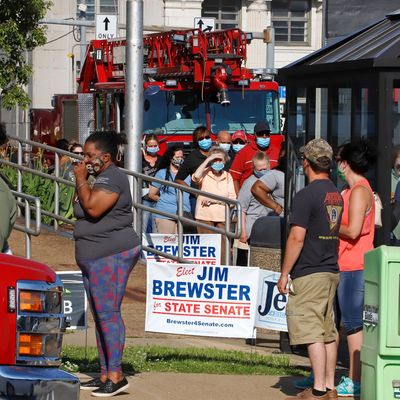
When election experts theorize about the “red mirage” scenario (coined by the digital data firm Hawkfish) whereby very slow counts of disproportionately Democratic mail ballots give Republicans misleading Election Night leads, the two states most often mentioned as contributing to the problem are Michigan and Pennsylvania. These are two crucial battleground states with divided partisan control (Democratic governors and Republican legislatures) that have only recently begun to allow no-excuse voting by mail. The Democratic vote in both is dominated by large cities (Detroit and Philadelphia) with histories of election-administration problems.
In Michigan’s August primary, there were significant (though not catastrophic) delays in counting votes newly dominated by mail ballots, and over 10,000 were rejected, mostly because they missed the Election Day deadline for being received by election officials. In Pennsylvania, which held its primary in June, the count, especially in Philadelphia, was very slow, as a local news outlet reported a week later:
Though some races were called on election night, others took days. And a few are still too close to call …
As of 1:30 p.m., Philadelphia still had more than 100,000 mailed ballots to count out of 160,656 received, the City Commissioners told NBC10.
In both Michigan and Pennsylvania (and ten other states, including two other 2020 battlegrounds, New Hampshire and Wisconsin) state laws prohibit initial processing or counting of mail ballots until Election Day. Michigan’s Republican legislators have been dragging their feet on changing that extremely troublesome requirement, and those in Pennsylvania are offering only three days of pre–Election Day processing (Democrats support three weeks).
In Washington, Democrats have been pressing for election assistance as part of long-stalled coronavirus relief and stimulus legislation (the House-passed HEROES Act includes $3.6 billion for that purpose), but neither congressional Republicans nor the White House has accepted such assistance as a priority, or even as germane to the legislation. So state and local officials, and particularly the Democrats who fear the red mirage, are having to make their own preparations. As Politico reports, Governor Tom Wolf is sounding the alarm in Pennsylvania:
With concerns about an Election Day debacle rising in this critical swing state, Pennsylvania Gov. Tom Wolf privately convened a group of Philadelphia Democrats recently to underscore the consequences of another vote-counting fiasco like the one that took place in the June primary.
The city took more than two weeks to count all of its votes due to a massive surge in mail voting amid the coronavirus pandemic — and a repeat performance might make it unclear who won the presidential election in the key battleground state long past Nov. 3.
Top Democrats here are intent on not giving Trump any ammunition for his expected claims of fraud.
“It’s just unacceptable,” said a high-ranking state Democrat of the city’s handling of the primary. “Can you imagine if we’re waiting on Pennsylvania and there’s still 300,000 uncounted votes in Philadelphia? Can you even imagine?”
Because they can imagine it, state and local Democrats are scrambling to come up with the resources to speed up mail-ballot processing while also improving Election Day in-person voting operations. A $10 million private nonprofit grant received by Philadelphia could be particularly important:
City election officials said the additional money puts them in a vastly better position than they were in June. They expect to open at least 800 polling places in Philadelphia in November, compared to fewer than 200 during the primary. Most of the $10 million in nonprofit funding is going toward costly equipment that will enable them to print, sort and scan ballots more quickly, according to the city’s grant agreement.
The situation is made more urgent by a legacy of largely unsubstantiated Republican claims of voter fraud in Philadelphia, and the likelihood that the partisan split in voting methodologies feeding the red mirage will be especially acute in Pennsylvania:
“Pennsylvania is likely to be ground zero for the ‘red mirage,’” said Ellen Konar, vice president of voter research at Hawkfish. “Ninety percent of Trump supporters plan to use the polling place; only 10 percent [plan to vote by mail]. And for Democrats, it’s 36 percent in the polling place versus 64 percent by mail.”
And even with additional equipment and possibly permission to begin processing mail ballots before Election Day, there’s only so much that can be done to avoid the red mirage. One Philadelphia city commissioner told Politico that the results will be tabulated “within seven days,” though “the hope would have it be done within maybe two days, three days.”
That’s still plenty of time for Trump to wreak havoc if he’s well ahead on Election Night. But preparations like those in Pennsylvania will help minimize the risk of a contested election. Democrats in other battleground states that are relatively new to massive voting by mail should be holding their own emergency meetings, and Republicans should ask themselves if they really want to follow their leader down the road to a manufactured constitutional crisis.






























